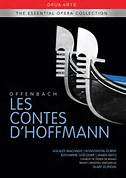|
Back
12/01/2013
Jacques Offenbach: Les Contes d'Hoffmann
Aquiles Machado (Hoffmann), Konstantin Gorny (Lindorf, Coppélius, Dr. Miracle, Dapertutto), Katharine Goeldner (Nicklausse, The Muse), María Bayo (Antonia), Valentina Kutzarova (Giulietta), Milagros Pobalador (Olympia), Christophe Fel (Luther, Crespel), Christian Jean (Spalanzani), Itxaro Mentxaka (Antonia's Mother), José Ruiz Andrès, Frantz, Cochenille, Piticinaccio), Marco Moncloa (Hermann, Schlémil), Manuel de Diego (Nathanaël), Itziar Fernández de Unda (Stella), David Aguayo Marqués (Bass Voice), Chorus of Ópera de Bilbao, Boris Dujin (Chorus Master), Bilbao Orkestra Sinfonikoa, Alain Guingal (Conductor), Gian Carlo del Monaco (Director), Michael Scott (Set & Costume Designer), Wolgang von Zoubek (Lighting Designer), Angel Luiz Ramírez (Video Director)
Recorded live at Palacio Euskalduna de Bilbao (May 12 & 15, 2006) – 185'
2 DVDs Opus Arte Catalogue #: OAMO6006D (Blu-ray) – Liner Notes in English, French, & German – Subtitles in English, French, German, Italian – Audio Format: LPCM 2.0 – DTS Digital Surround – Picture: 16:9 Anamorphic – All regions

   
This Giancarlo del Monaco staging of Hoffmann's Tales is a novel and very dark take on Offenbach's "Opéra fantastique," and it is a very appealing one.
Here, Hoffmann is the incarnation of the deformed and drunkard Kleinzach from the eponymous song in the Prologue. Whether he is or not, is not relevant, but it works darn well: the concept is carried throughout consistently and the libretto never contradicts Del Monaco's premise. Dark sets, dark costumes, somber moods, and a shady atmosphere do not alter the predominant nobility and sincerity that are the cornerstones of the central character, crushed underfoot by a world of idiotic cynics and charlatans.
Vocally, we are in the top-notch category, with no one trying to outdo anyone else. Venezuelan tenor Aquiles Machado is a first class Hoffmann. Some would say he is the typical roly-poly tenor that Italy would produce in large numbers years ago. Maybe, but he is a convincing actor with all the vocal requirements for this treacherous role. In Act II, with its extended passaggio singing, he shows consummate technique.
All three feminine parts are held with incredible talent. Pobalador (Olympia) shows no strain in the coloraturas of "Les oiseaux dans la charmille...", María Bayo is a strong Antonia who does excellent justice to "Elle a fui, la tourterelle…", while Kutzarova's Giulietta, musically a little flat in the Barcarolle, pins a classy characterization of the seductive intriguer. Russian bass Konstantin Gorny receives a justified ovation. The voice is powerful in all registers and the depiction of the four villains is compelling. His demanding "Scintille diamant..." is sung with a firm voice and outstanding panache. His French enunciation is near perfect, a common trait to all non-French natives in the cast, except maybe the chorus. They sing with confidence but I was able to catch very few words. Katharine Goeldner is more than convincing in the difficult part of Nicklausse and she, too, is enthusiastically greeted at curtain call. All other supporting roles are extremely well cast.
From the pit, Alain Guingal is in-sync with the gravitas of the stage, unveiling some orchestral motifs with a quasi-Wagnerian depth rarely heard in Les Contes d'Hoffmann. The sound of the Bilbao Orkestra Sinfonikoa is lush, occasionally a tad too loud, but this is imputable to the sound engineer.
Opinions may diverge on this unusual reading of Hoffmann's Tales. Despite its dark colors and shady undertones, it stands as a novel and intelligent approach.
Extra features include interviews with María Bayo, Aquiles Machado, & Juan Carlos Matellanes (President of Ópera de Bilbao), illustrated synopsis and cast gallery.
Christian Dalzon
|